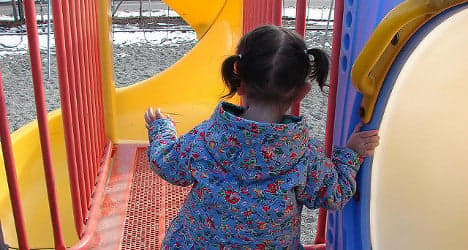Swiss court rules child ‘too pampered’ for school

A seven-year-old boy in the canton of St Gallen must attend a specialist school because his over-protective parents have left him unable to do things for himself, Switzerland’s highest court has ruled.
The child, named in the Swiss press as Marko, was told to attend a specialist school by child psychologists who judged him to have developmental difficulties, reported newspaper Sonntags Zeitung on Sunday.
According to a school psychologist, the boy’s parents “remove all obstacles” and keep him away from everyday learning experiences such as playing with other children.
As a result of this pampered life, he was unable to cope in a regular school environment, they said.
Marko’s parents denied the psychologists’ report, saying their son had a “normal childhood”.
Objecting to the decision and fearing that a special school would be detrimental to the child’s development, they took their case to the Federal Civil Court in Lausanne, but the decision was upheld.
Now the parents intend to pursue their case in the European Court of Human Rights, said the paper.
Lack of play time
The news comes as a report commissioned by Swiss children’s foundation Pro Juventute, published on Monday, revealed that children in Switzerland get little or no time to play outside without adult supervision.
“While children in the 1970s spent a great deal of their free time outside and were active for three to four hours a day, the situation today is a lot more gloomy”, said the organization in a statement.
Children in German-speaking Switzerland spend just 32 minutes a day outside unsupervised, while those in French-speaking Switzerland are even more confined indoors, spending only 20 minutes outdoors, it said.
The study of 649 families undertaken by the University of Fribourg found that a third of children were not allowed to play outside without adult supervision, and 15 percent did not play outdoors at all.
“Physical activity and free play benefit children’s physical health as well as their mental well-being, language, emotions and social behaviour,” said Urs Kiener of Pro Juventute.
The frequency and length of time spent by children playing outside depends largely on the attitude of parents towards play areas and the possibilities children have to play with others where they live.
Comments
See Also
The child, named in the Swiss press as Marko, was told to attend a specialist school by child psychologists who judged him to have developmental difficulties, reported newspaper Sonntags Zeitung on Sunday.
According to a school psychologist, the boy’s parents “remove all obstacles” and keep him away from everyday learning experiences such as playing with other children.
As a result of this pampered life, he was unable to cope in a regular school environment, they said.
Marko’s parents denied the psychologists’ report, saying their son had a “normal childhood”.
Objecting to the decision and fearing that a special school would be detrimental to the child’s development, they took their case to the Federal Civil Court in Lausanne, but the decision was upheld.
Now the parents intend to pursue their case in the European Court of Human Rights, said the paper.
Lack of play time
The news comes as a report commissioned by Swiss children’s foundation Pro Juventute, published on Monday, revealed that children in Switzerland get little or no time to play outside without adult supervision.
“While children in the 1970s spent a great deal of their free time outside and were active for three to four hours a day, the situation today is a lot more gloomy”, said the organization in a statement.
Children in German-speaking Switzerland spend just 32 minutes a day outside unsupervised, while those in French-speaking Switzerland are even more confined indoors, spending only 20 minutes outdoors, it said.
The study of 649 families undertaken by the University of Fribourg found that a third of children were not allowed to play outside without adult supervision, and 15 percent did not play outdoors at all.
“Physical activity and free play benefit children’s physical health as well as their mental well-being, language, emotions and social behaviour,” said Urs Kiener of Pro Juventute.
The frequency and length of time spent by children playing outside depends largely on the attitude of parents towards play areas and the possibilities children have to play with others where they live.
Join the conversation in our comments section below. Share your own views and experience and if you have a question or suggestion for our journalists then email us at [email protected].
Please keep comments civil, constructive and on topic – and make sure to read our terms of use before getting involved.
Please log in here to leave a comment.